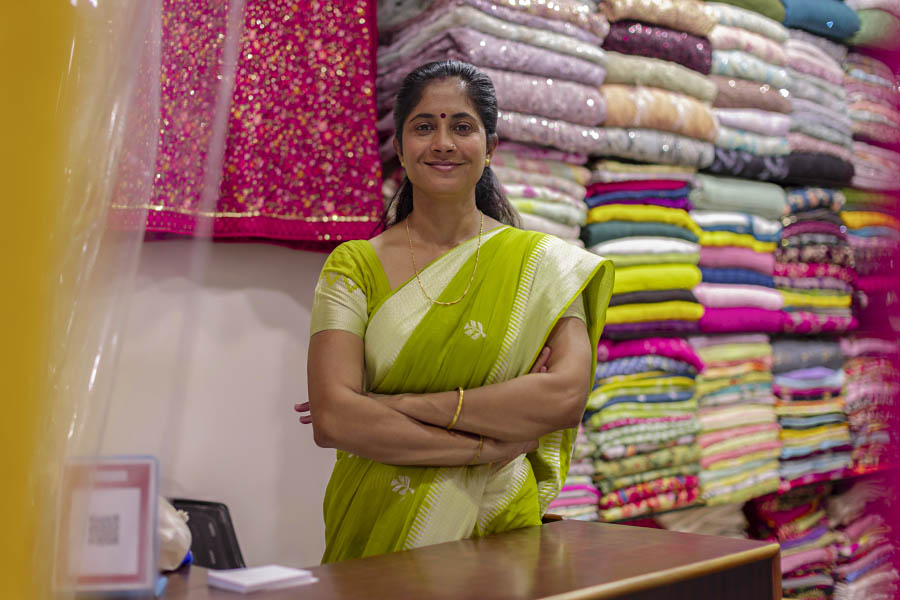HOW IT WORKS
Saree Shops

- Saree shops specialize in selling traditional Indian attire, known as sarees. These establishments offer a variety of saree styles, fabrics, and designs, often catering to cultural preferences and occasions such as weddings, festivals, and formal events.
Saree shops are retail stores that specialize in selling traditional Indian garments known as sarees. These stores cater to a target audience primarily consisting of women who are looking for elegant and culturally significant attire for various occasions such as weddings, festivals, and special events. Saree shops offer a wide range of sarees in different fabrics, designs, colors, and patterns to suit the diverse preferences of customers.
Common products or services offered by saree shops include sarees made from silk, cotton, chiffon, georgette, and other materials, as well as matching blouses and accessories. Some saree shops also provide customization services to tailor sarees according to customers’ specific requirements. Business models in this industry typically involve sourcing sarees from manufacturers or wholesalers and selling them at a retail markup.
Notable trends and innovations within the saree shop industry include the integration of online platforms for e-commerce sales, virtual try-on technologies, and collaborations with fashion designers to offer exclusive collections. The unique value proposition of saree shops lies in their ability to provide customers with a culturally rich and aesthetically pleasing shopping experience, along with personalized styling advice and assistance.
Challenges faced by saree shops may include competition from online retailers, changing fashion trends, managing inventory and supply chain logistics, and maintaining customer loyalty in a rapidly evolving market. Overall, saree shops play a vital role in preserving and promoting traditional Indian attire while adapting to modern consumer preferences and technological advancements in the fashion industry.
Initial Stage: In the competitive realm of Saree shops, the operational cycle begins with a thorough analysis of market opportunities and consumer needs. By understanding the diverse preferences and trends in the Saree industry, the business can identify gaps and potential areas for growth.
Product Formulation: To meet the demands of the discerning customer base, the Saree shop formulates its products with a keen focus on quality, design, and variety. Emphasizing unique features such as handcrafted embroidery, traditional motifs, and premium fabrics, the shop aims to differentiate itself and offer value propositions that resonate with customers.
Marketing and Promotion: Effective marketing and promotional strategies are crucial in reaching target audiences and generating interest in the Saree shop. Utilizing social media platforms, influencer partnerships, and traditional advertising channels, the shop can create awareness and drive foot traffic to its physical or online store.
Sales and Distribution: The Saree shop carefully selects distribution channels that align with its brand image and customer base. Whether through exclusive boutiques, online marketplaces, or pop-up events, the shop ensures seamless customer interactions and personalized shopping experiences.
Post-Sale Services: Customer satisfaction and loyalty are paramount in the Saree industry. The shop prioritizes post-sale services such as alterations, customization, and styling consultations to enhance the overall shopping experience and build lasting relationships with customers.
Continuous Improvement: Feedback from customers and market trends play a crucial role in shaping the Saree shop’s continuous improvement efforts. By staying agile and adaptive, the shop can innovate its product offerings, refine its marketing strategies, and maintain a competitive edge in the dynamic Saree market landscape.
In the Saree Shops business category, daily operations face challenges such as resource management (ensuring enough stock availability), communication & collaboration (coordinating with suppliers and customers), process inefficiency (long wait times for customers), inventory management (keeping track of various saree styles), quality control (ensuring sarees are of high quality), technology integration (implementing inventory software), data management (maintaining customer information), and risk management (dealing with fashion trends). Solutions include implementing inventory tracking systems, improving communication channels, training staff on quality standards, investing in technology for data management, and staying updated on fashion trends.
-
Webspad revolutionized our saree shop operations by seamlessly integrating inventory tracking systems, enhancing communication channels, and providing valuable insights on current fashion trends. With their tech expertise and user-friendly tools, we effectively managed our resources, improved process efficiency, and ensured high-quality sarees for our customers. Thanks to Webspad, we now have a competitive edge in the dynamic saree market and can focus on delivering exceptional post-sale services to build lasting customer relationships.
Saree Shops Merchant Tweet / X

